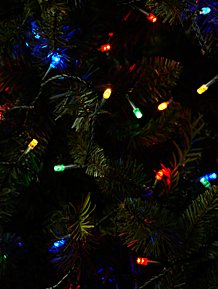Consumers are being warned about the dangers of buying Christmas tree lights through online marketplaces, as a new Which? investigation reveals almost half of the products it tested could cause a fire or electric shock.
The consumer champion carried out a series of tests according to the electrical safety standard – which products must pass to be sold in the UK – on 13 products bought from third party sellers across four online marketplaces, as well as two purchased from high street retailers.
Six out of the 13 sets of Christmas tree lights bought through online marketplace sellers failed the testing and are dangerous to use. AliExpress, eBay and Wish each sold two products that failed the tests.
In two instances, control boxes on lights bought from AliExpress and eBay got so hot during a short circuit test they began to smoke and then melt. The insides were left charred and the printed circuit board was reduced to a molten plastic mess by the end of the test.
Several of the products also presented an electric shock risk. In an electrical strength test, the insulation in one control box for a set of lights bought from Wish broke down, making the whole unit live, meaning it would be a hazard for anyone who came into contact with it.
Similarly, when Which? checked the distances between the live and neutral parts of the circuit board, it was found that the distances were up to half of the legal requirement for three sets of lights. In the worst cases, this could lead to arcing – where electricity travels through the air – and an electric shock for anybody touching the lights.
The same three products, bought from AliExpress, Ebay and Wish, were so shoddily manufactured that, using minimum force, testers were able to pull the cable out of the control box – once again risking a shock.
Five products from Amazon Marketplace passed all the electrical safety tests, while lights from high street retailers John Lewis and Argos also passed.
In addition, Which? carried out checks including whether the products had the correct markings and instructions required to be legally sold in the UK. It found that nine of the 13 did not comply with the official standard. Three products that melted during the circuit test were so catastrophically damaged that a compliance check was not carried out.
The 12 unsafe or non-compliant products were purchased from third party sellers across all four marketplaces, In total, just one set of lights bought from across the four online marketplaces passed all of the safety tests and a compliance check. These were purchased from Amazon Marketplace.
Both sets of lights bought from high street shops also met all the compliance requirements as well as passing the safety tests.
Which? was able to identify several features that many of the lights that failed to pass the safety tests shared, and serve as warning signs that the products could be dodgy. These include lights packaged in plain plastic wrapping with no branding, as well as a lack of instructions. The worst performing lights – those where the control boxes melted – cost less than five pounds from the online marketplace sellers they were bought from.
Which? is advising anyone buying Christmas lights to do so from the high street or a recognised retailer and recommends that anyone who suspects they may have purchased dangerous lights immediately take them down.
The results are the latest in a long line of unsafe products on online marketplaces highlighted by Which?. In September, Which? found dozens of USB chargers, travel adaptors and power banks listed for sale that were so poorly designed that they could cause electric shocks or start fires.
Which? is now calling for online marketplaces to have greater legal responsibility for the safety of products sold on their sites, as well as clearer requirements for taking down unsafe products, and greater transparency for shoppers about who they’re buying from.
Natalie Hitchins, Which? Head of Home Products and Services, said:
“Many of the cheap and seemingly cheerful Christmas lights we’ve tested from online marketplaces simply aren’t safe, and we’ve found some even have the potential to set a tree alight.
“The significantly better performance of products bought from high street retailers exposes just how necessary it is to strengthen consumer protections for online marketplaces. The new government must make safety a priority and put the legal responsibility on marketplaces to prevent unsafe products from being sold on their sites.”







